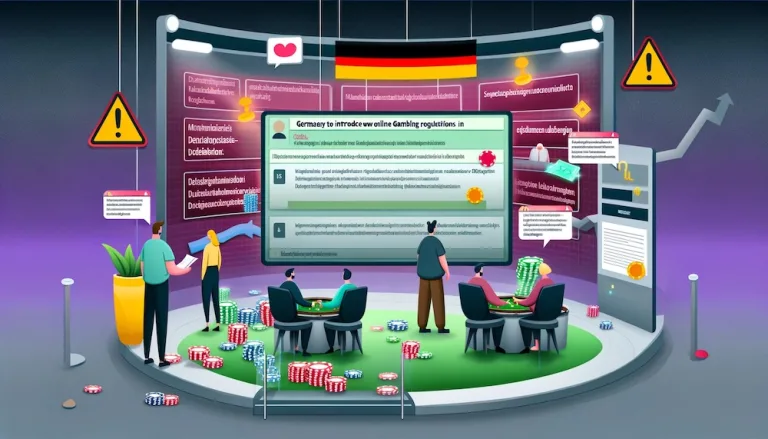Starting September 1, 2024, Germany will implement new online gambling regulations designed to enhance player protection, ensure fair play, and combat illegal activities. These comprehensive measures mark a significant shift in the country’s approach to online gambling, aiming to create a safer and more regulated environment for players. This article explores the key aspects of Germany’s new regulations, their benefits, challenges, and future implications for the online gambling industry.
Key Aspects of the New Regulations
Licensing Requirements
One of the cornerstone aspects of the new regulations is the introduction of stringent licensing requirements for online gambling operators. By September 2024, all operators must obtain a license from the German regulatory authority to legally offer their services. This includes thorough background checks, financial audits, and compliance with strict operational standards to ensure the legitimacy and integrity of the operators.
Enhanced Player Protection Measures
The new regulations place a strong emphasis on player protection. Operators will be required to implement robust measures to prevent gambling addiction, including mandatory self-exclusion programs, deposit limits, and regular player activity monitoring. Additionally, operators must provide clear information about the risks associated with gambling and offer resources for players seeking help with gambling-related issues.
Anti-Money Laundering (AML) Compliance
To combat illegal activities such as money laundering, the regulations mandate rigorous AML compliance. Operators must implement advanced transaction monitoring systems to detect and report suspicious activities. This includes verifying player identities, monitoring large or unusual transactions, and maintaining detailed records for regulatory review. These measures aim to ensure that the online gambling sector is free from financial crime.
Benefits of the New Regulations
Increased Player Safety
The primary benefit of Germany’s new online gambling regulations is the increased safety for players. By enforcing strict licensing requirements and enhanced player protection measures, the regulations help create a safer and more responsible gaming environment. This protects players from potential harms associated with gambling addiction and fraudulent activities.
Greater Market Transparency
The new regulations will bring greater transparency to Germany’s online gambling market. Licensed operators must adhere to high standards of fairness and integrity, ensuring that players can trust the games they are participating in. This transparency is crucial for building player confidence and promoting a positive image of the online gambling industry.
Revenue Generation for the Government
By legalizing and regulating online gambling, Germany stands to generate significant revenue from licensing fees and taxes on operators. These funds can be used to support public services and infrastructure projects, contributing to the overall economy. The regulatory framework ensures that the gambling industry contributes its fair share to the national budget.
Challenges of Implementing the New Regulations
Ensuring Compliance
Ensuring compliance with the new regulations presents a significant challenge. The regulatory authority must have the resources and capabilities to conduct thorough audits and enforce the rules. Operators will need to invest in technology and staff training to meet the regulatory requirements, which can be costly and complex.
Addressing the Black Market
One of the ongoing challenges will be addressing the black market for online gambling. Unlicensed operators may continue to offer their services, posing risks to players who seek out unregulated options. The regulatory authority must work to identify and shut down these illegal operators while educating players about the risks of using unlicensed platforms.
Balancing Regulation and Innovation
Striking the right balance between regulation and innovation is crucial for the long-term success of the online gambling industry in Germany. Overly restrictive measures could stifle creativity and hinder the development of new gaming products and services. Policymakers must ensure that the regulatory framework allows for innovation while maintaining robust player protection and market integrity.
Future Implications for the Online Gambling Industry
Technological Advancements
The future of Germany’s online gambling industry will likely see the adoption of technological advancements to support compliance and innovation. Technologies such as artificial intelligence (AI) and blockchain can enhance transparency, security, and efficiency in gambling operations. AI can provide real-time monitoring and predictive analytics, while blockchain can ensure immutable and transparent record-keeping.
Expansion of Regulated Offerings
As the regulatory framework takes effect, there may be an expansion of regulated gambling offerings. This could include new types of games, mobile applications, and interactive platforms that cater to diverse player preferences. The growth of regulated offerings can attract more players to legal channels, reducing the appeal of the black market.
International Collaboration
Germany’s regulatory model could serve as a blueprint for other countries looking to regulate online gambling. International collaboration and the sharing of best practices can lead to a more cohesive and effective global regulatory environment. This cooperation can enhance player protection and ensure fair play across borders.
Conclusion
Germany’s new online gambling regulations set to take effect on September 1, 2024, represent a significant step toward enhancing player protection, ensuring fair play, and combating illegal activities. While there are challenges to address, the benefits of increased player safety, market transparency, and revenue generation are substantial. As the online gambling industry continues to evolve, these regulations will play a crucial role in ensuring a safer, more regulated environment for all participants. Whether you are a player seeking a secure gaming experience or an operator committed to compliance, Germany’s new regulations offer a framework for achieving these goals.



